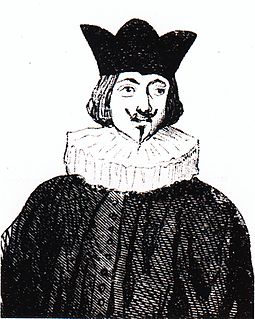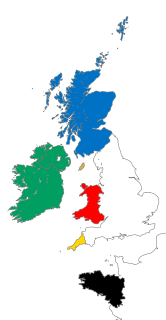Related Research Articles

Breton is a Southwestern Brittonic language of the Celtic language family spoken in Brittany, modern-day France. It is the only Celtic language still in use on the European mainland.

Normandy is a geographical and cultural region in Northwestern Europe, roughly coextensive with the historical Duchy of Normandy.

Brittany is a peninsula, historical country, and cultural area in the west of modern France, covering the western part of what was known as Armorica during the period of Roman occupation. It became an independent kingdom and then a duchy before being united with the Kingdom of France in 1532 as a province governed as a separate nation under the crown.

Marie de France was a poet, possibly born in what is now France, who lived in England during the late 12th century. She lived and wrote at an unknown court, but she and her work were almost certainly known at the royal court of King Henry II of England. Virtually nothing is known of her life; both her given name and its geographical specification come from her manuscripts. However, one written description of her work and popularity from her own era still exists. She is considered by scholars to be the first woman known to write francophone verse.
French literature generally speaking, literature written in the French language, particularly by citizens of France; it may also refer to literature written by people living in France who speak traditional languages of France other than French. Literature written in the French language, by citizens of other nations such as Belgium, Switzerland, Canada, Senegal, Tunisia, Algeria, Morocco, etc. is referred to as Francophone literature. France itself ranks first on the list of Nobel Prizes in literature by country.
Jèrriais is a Romance language and the traditional language of the Jersey people. It is a form of the Norman language spoken in Jersey, an island in the Channel Islands archipelago off the coast of France. Its closest relatives are the other Norman languages, such as Guernésiais, spoken in neighbouring Guernsey, and the other langues d'oïl.

Catalan literature is the name conventionally used to refer to literature written in the Catalan language. The focus of this article is not just the literature of Catalonia, but literature written in Catalan from anywhere, so that it includes writers from the Valencian Community, Balearic Islands and other territories where Catalan or its variants are spoken.

The Celtic Revival was a variety of movements and trends in the 19th and 20th centuries that saw a renewed interest in aspects of Celtic culture. Artists and writers drew on the traditions of Gaelic literature, Welsh-language literature, and so-called 'Celtic art'—what historians call Insular art. Although the revival was complex and multifaceted, occurring across many fields and in various countries in Northwest Europe, its best known incarnation is probably the Irish Literary Revival. Irish writers including William Butler Yeats, Lady Gregory, "AE" Russell, Edward Martyn, Alice Milligan and Edward Plunkett stimulated a new appreciation of traditional Irish literature and Irish poetry in the late 19th and early 20th century.

The langues d'oïl are a dialect continuum that includes standard French and its closest autochthonous relatives historically spoken in the northern half of France, southern Belgium, and the Channel Islands. These belong to the larger category of Gallo-Romance languages, which also include the historical languages of east-central France and western Switzerland, southern France, portions of northern Italy and the Val d'Aran in Spain.

Norman or Norman French is, depending on classification, either a French dialect or a Romance language which can be classified as one of the Oïl languages along with French, Picard and Walloon. The name "Norman French" is sometimes used to describe not only the Norman language, but also the administrative languages of Anglo-Norman and Law French used in England. For the most part, the written forms of Norman and modern French are mutually intelligible. This intelligibility was largely caused by the Norman language's planned adaptation to French orthography (writing).

Gallo is a regional language of eastern Brittany. It is one of the langues d'oïl, a Romance sub-family that includes French. Today it is spoken only by a minority of the population, as the standard form of French now predominates in this area.

Breton literature may refer to literature in the Breton language (Brezhoneg) or the broader literary tradition of Brittany in the three other main languages of the area, namely, Latin, Gallo and French – all of which have had strong mutual linguistic and cultural influences.
The term Middle English literature refers to the literature written in the form of the English language known as Middle English, from the late 12th century until the 1470s. During this time the Chancery Standard, a form of London-based English became widespread and the printing press regularized the language. Between the 1470s and the middle of the following century there was a transition to early Modern English. In literary terms, the characteristics of the literary works written did not change radically until the effects of the Renaissance and Reformed Christianity became more apparent in the reign of King Henry VIII. There are three main categories of Middle English literature, religious, courtly love, and Arthurian, though much of Geoffrey Chaucer's work stands outside these. Among the many religious works are those in the Katherine Group and the writings of Julian of Norwich and Richard Rolle.

Medieval French literature is, for the purpose of this article, Medieval literature written in Oïl languages during the period from the eleventh century to the end of the fifteenth century.
20th-century French literature is literature written in French from 1900 to 1999. For literature made after 1999, see the article Contemporary French literature. Many of the developments in French literature in this period parallel changes in the visual arts. For more on this, see French art of the 20th century.
Cretan Greek, or the Cretan dialect, is a variety of Modern Greek spoken in Crete and by the Cretan diaspora.
Standard French is an unofficial term for a standard variety of the French language. It is a set of spoken and written formal varieties used by the educated francophones of several nations around the world.

Welsh-language literature has been produced continuously since the emergence of Welsh from Brythonic as a distinct language in around the 5th century AD. The earliest Welsh literature was poetry, which was extremely intricate in form from its earliest known examples, a tradition sustained today. Poetry was followed by the first British prose literature in the 11th century. Welsh-language literature has repeatedly played a major part in the self-assertion of Wales and its people. It continues to be held in the highest regard, as evidenced by the size and enthusiasm of the audiences attending the annual National Eisteddfod of Wales, probably the largest amateur arts festival in Europe, which crowns the literary prize winners in a dignified ceremony.

Asturian literature is the writings in the Asturian language of the northwest Iberian Peninsula. The earliest documents date back to the 10th century, but the peak period of literary output was in the 18th century, with a late 20th century revival.

In addition to English, literature has been written in a wide variety of other languages in Britain, that is the United Kingdom, the Isle of Man and the Channel Islands. This includes literature in Scottish Gaelic, Welsh, Latin, Cornish, Anglo-Norman, Guernésiais, Jèrriais, Manx, and Irish. Literature in Anglo-Saxon is treated as English literature and literature in Scots as Scottish literature.